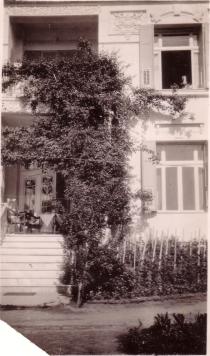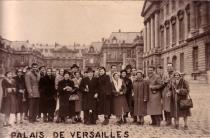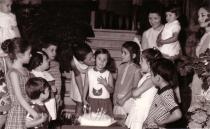Grandmother Mathilde Saltiel, Sento Saltiel and Arnaldo Tazartes
This is a picture of my grandmother Mathilde (center), uncle Sento Saltiel (left), and my friend Arnaldo Tazartes (right) at the veranda of my grandmother's house in Thessaloniki.
After I came back to Thessaloniki, I lived with grandmother Mathilde and grandfather Daniel. They lived downstairs and we had rented out the top floor.
My grandfathers' son, Sento, lived separately. My grandmother had a brother who was a Spanish citizen and he had survived. He was younger than her and he was called Saltiel Gattegno. He came with his sister and stayed with us.
There was also another young man. His name was Maurice Florentin. He was the brother of a friend of mine, a bit younger than me. Maurice was saved because he was in the mountains.
He was with the partisans. He was wounded in a battle and one leg of his was quite shorter. He had to wear shoes that one of them had a thicker sole, so that his legs would be even. He was on his own too.
His brother had left for the Middle East secretly. He had lost his parents. We took him with us, because the house that we were going to live was too big.
Grandmother and grandfather had one room, I had one room, her brother had another, and so did Maurice. Maurice stayed for one year and later he left and went to Athens.
Sento was born around 1898. He went to the Alliance school as well. He finished the high school at the Alliance school. He knew French very well; he also knew Greek and Ladino. I think he also attended German classes. Many of the Jews here were speaking German at the time.
Sento got married when my father got married, around 1920. His wife's' name was Mathilde Gattegno. The name of her father, his father in law, was Moshe Gattegno.
The father of Mathilde, Moshe Gattegno was the brother of my grandmother Rosa. So Sento and Mathilde were first degree cousins. The mother of Mathilde was from the Sadok family who were a very well known aristocratic family.
It was quite common to have marriages of relatives at the time. There were financial issues at stake as well, to keep the money within the family. Not to let it go to foreign hands.
Sento and Mathilde had two children. One was Rosa who is exactly the same age as me, and Flora who is five or six years younger.
At some point grandfather Saltiel took his son Sento at his own business. Sento worked at his father's in law. He was a Gattegno; and had a jewellery shop at the corner of Tsimiski and Venizelou streets.
After he worked there for many years, my father took him to work for him. I suppose that this was after 1930. And he was a good merchant. He became very good especially after Daniel Saltiel had a problem with his eyesight.
When my grandfather was very young and his older brother Beniko was keeping him, I don't know how, he fell off his hands and he lost one eye. But he didn't take this eye out and put a glass one. Instead, he left it and this infected his other eye too.
He had to go about ten times to Vienna for operations because he was slowly loosing his eyesight. One of the times that he went, my grandmother went with him and they stayed there for over two months.
The Saltiels were Spanish citizens. After the deportations were completed in Thessaloniki, they gathered all the Spanish citizens in the synagogue. And they told them, "you have two hours to take your personal belongings and come here. The train is ready. Come back here. We will send you to Spain".
Sento with his father Daniel and his wife Mathilde, all left together. They took them to Bergen-Belsen first. From there they passed through the whole of occupied France and arrived in Spain, where they stayed for around 20 days in Barcelona.
From there, they took them to Morocco and to Casablanca, where the allies, the French and English, had already entered. They first put them in an army camp where there were many children both Greek and from other countries.
Since Mathilde Saltiel knew French so well, they had her teach the young children. In fact, when they left, they gave her a diploma, thanking her for being such a good teacher with the children. Afterwards, they went through Morocco to Gaza and to Tel Aviv, where they had relatives.
After the war Sento started the lumber trade again. He co-operated with someone that he knew, who used to be an old lumber trader too. His name was Bilimatsis, a well-known merchant.
They co-operated and their work went really well. Very quickly they managed to remake the shop again. It was the golden age of trade then, after the war ended and we were liberated.
When they grew older, they both got their pensions and Sento went to live in Athens. His wife Mathilde died before him.


















































